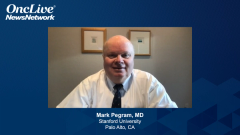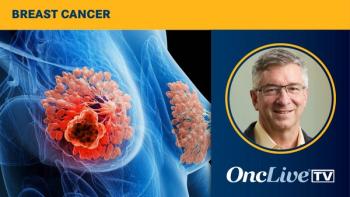
Future Landscape of HER2+ MBC
Drs. Sara Tolaney and Mark Pegram discuss promising therapies and upcoming mechanisms of actions to treat HER2+ metastatic breast cancer.
Episodes in this series
Transcript:
Sara Tolaney, MD: The findings from DESTINY-Breast03 [DB03] are dramatically clear because it is such a profound difference between the 2 arms. I don’t think I’ve actually ever seen a P-value like that before with a hazard ratio this low, and so, in my mind, there’s no question that trastuzumab deruxtecan [T-DXd] is a better choice for the vast majority of our patients than T-DM1 [trastuzumab emtansine]. I really do think it should be incorporated into the second-line setting as our new standard of care given the very dramatic differences you’re seeing in progression-free survival [PFS], the very high objective response rate being about 80%, and the very high complete response rate, as well as this trend towards overall survival.
At ESMO [European Society for Medical Oncology meeting], we saw some data that came out looking at another novel antibody-drug conjugate [ADC] called SYD985 or trastuzumab duocarmazine, which was compared to treatment of physician’s choice with trastuzumab so really comparing it to chemotherapy trastuzumab. We did see that the trastuzumab duocarmazine was better than chemotherapy, physician’s choice treatment. The difference was about 2 months in terms of the PFS but there were some toxicities that we’re going to have to balance when utilizing this agent in the future. Ocular toxicity occurred in almost 80% of patients, as well as some risk of ILD [interstitial lung disease], which occurred in almost 8% of patients. I think that antibody-drug conjugate does seem to be promising, but will have to be balanced with its toxicities. There are certainly lots of other novel ADCs that are in development for HER2 [human epidermal growth factor receptor 2]-positive disease, and I wonder if this will be our way forward for HER2-positive breast cancer because we’re seeing such potent activity with antibody-drug conjugates. It makes you wonder if we’ll be able to sequence ADCs after ADCs in the future for our metastatic patients.
Mark Pegram, MD: There are important future studies that are ongoing in HER2-positive metastatic breast cancer. Based on the strength of the DESTINY-Breast03 data there’s a new trial looking at T-DXd in the first-line setting in HER2-positive metastatic disease. DESTINY-Breast09 is untreated HER2-positive metastatic breast cancer. It’s a 3 arm study with randomization 1:1:1 to T-DXd versus T-DXd versus pertuzumab or the control arm of a CLEOPATRA-like regimen of taxane plus a dual antibody therapy with trastuzumab deruxtecan and pertuzumab. To be fair, there’s a separate trial called the HER2CLIMB-02 trial that is testing tucatinib plus T-DM1 versus placebo plus T-DM1, also that’s ongoing. That will test the hypothesis that moving tucatinib up into earlier lines may also be impactful in HER2-positive metastatic disease. In terms of early breast cancer, there’s a really interesting study called DESTINY-Breast05 which builds upon the strength of the KATHERINE trial of post neoadjuvant T-DM1 for patients who failed to achieve a [INAUDIBLE] complete response following dual antibody plus chemotherapy induction in the neoadjuvant setting. The DB03, informs the study design since this is also a head-to-head comparison of T-DM1 versus T-DXd in that post neoadjuvant setting for patients with residual disease following the neoadjuvant therapy. The primary end point will be IDFS [invasive disease-free survival] and along with that trial there’s another trial in the same space which is the CompassHER2 Residual Disease trial. In that study, patients with residual disease following dual antibody neoadjuvant therapy will be the standard T-DM1 in the control arm versus T-DM1 plus tucatinib. That will also be a very interesting trial that will attempt to build upon the strength of the KATHERINE study.
Finally, just a comment about antibody-drug conjugates for the future. I think we are going to still need multiple antibody-drug conjugates. I don’t think T-DXd will be the last in this class. The reason is, in my opinion, we need multiple non-cross resistant payloads. Consider the fact, for example, that in human’s solid tumor malignancies in a curative disease setting, almost without exception it’s always chemotherapy combinations or sequence that are superior to a single agent. I think the same principle will also apply to antibody-drug conjugates because they are chemotherapy at their core. So it might be possible, if toxicity isn’t limiting, to consider combination of ADCs or build ADCs with more than 1 payload to mimic combination chemotherapy regimens hopefully with less toxicity. And I must mention that there are new cytotoxic payloads that have already been built targeting HER2, such as immunologic payloads, and 1 is already in the clinic. We are doing [a] phase I study with Bolt Biotherapeutics in northern California and it has as trastuzumab antibody backbone with a toe-like receptor 7-8 payload which will augment inflammatory immunologic responses in the tumor marker environment. We submitted early data to San Antonio [Breast Cancer Symposium] for this coming year, so stay on the lookout for these novel antibody-drug conjugates with new and interesting payloads for the future. I think it’s time to graduate from payloads that have microtubal interacting payloads. We have a number of those that are already out there and in development further. We need novel payloads. T-DXd is a good example. A TOP1 [topoisomerase] payload is not something that we would have thought about in breast cancer heretofore and, consequently, we need to approach this in an unbiased fashion, build new ADCs with novel payloads, and test them in future generations of clinical trials.
Transcript edited for clarity.






































